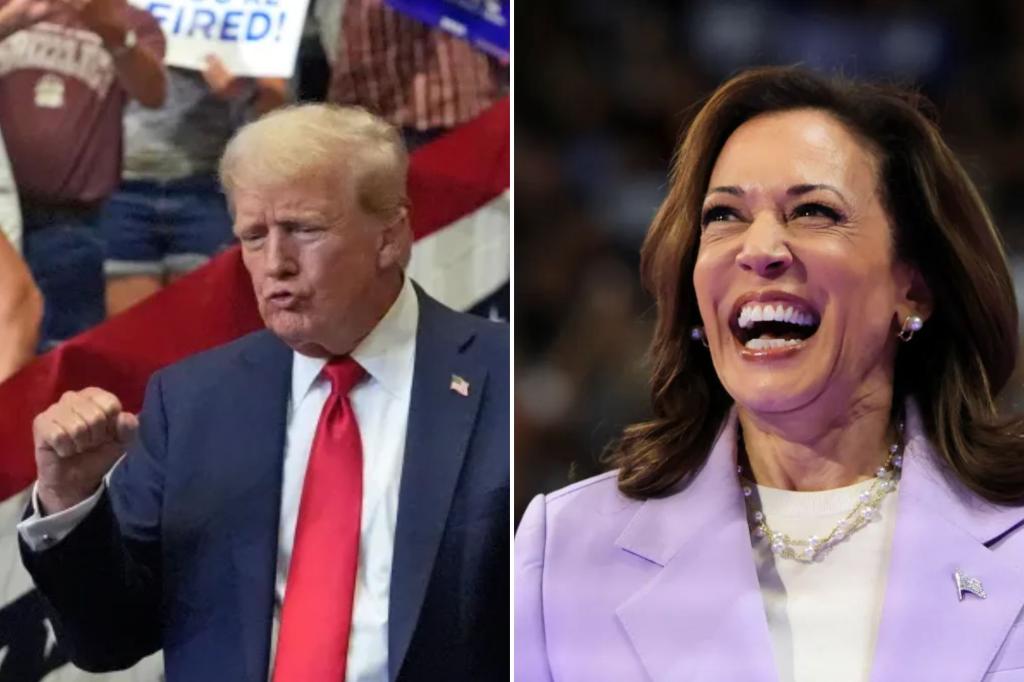Summarize this content to 2000 words in 6 paragraphs
Talk about mixed signals.
In a new poll, voters said they believe they’d be in better financial shape under former President Donald Trump than Vice President Kamala Harris — by a nine-point margin.
But, at the same time, a slight majority said they more faith in the veep to shepherd the US economy.
About 42% of registered voters felt they’d be “much” or “somewhat” better off if Trump wins in November — while 33% said the same about Harris, according to a survey by the Financial Times and the University of Michigan Ross School of Business.
Simultaneously, Harris narrowly eked out an advantage over Trump when it comes to trust on economic issues, 42% to 41%. It marks the first time the 45th president has been topped on the issue in the poll since tracking began about a year ago.
That marks a 7-point jump relative to President Biden’s figures on the economy from the group’s most recent prior survey.
Notably, the FT-Michigan Ross poll was conducted online by a Democratic strategist firm, Global Strategy Group.
“The fact that voters were more positive on Harris than on Biden . . . says as much about how badly Biden was doing as it does about how well Harris is doing,” Erik Gordon, a professor at the university, told the outlet.
Just a quarter of voters appraised the economy as “excellent” or “good.”
On the more economic-specific question about confronting China on trade issues, 43% trusted Trump more than Harris (39%), per the survey.
Overwhelming, Americans point to inflation as the top issue heading into the Nov. 5 presidential election.
Broadly speaking, a paltry 19% of voters feel that they are in better shape today than when Biden took office, according to the FT-Michigan Ross poll.
However, a sizeable chunk of those voters do not appear to be faulting Harris.
A firm 60% of respondents argued that Harris should either completely distance herself from Biden’s economic agenda or “make major changes,” per the survey.
Thus far, the poll’s finding about voters having more faith in Harris to handle the economy appears to be an outlier, as most surveys still peg Trump with an advantage on economic issues, which is routinely found to be voters’ No. 1 concern.
For example, a Bloomberg News/Morning Consult poll of swing state voters found Trump ahead (50% to 42%) when it comes to the question of “Who do you trust more to handle the economy.”
But the FT-Michigan Ross’ findings about voters feeling they’d be in better financial shape under Trump compared to Harris echoes the results of a handful of polls.
For instance, CNBC’s recent All-America Economic Survey found that by a margin of 2-to-1, Americans believe they will be in better financial shape under Trump than Harris. That poll sampled 1,001 Americans from July 31 to Aug. 4 with a margin of error of plus or minus 3.1 percentage points.
Still, across the board, polls have generally found Harris faring much better against Trump than Biden.
In terms of job approval, Harris scored a 46% approval rating, eclipsing the 41% that Biden scored in the FT-Michigan Ross poll.
Generally speaking, polls pegged Harris’ favorability ratings underwater, but after Biden dropped out and she abruptly ascended to the Democratic Party nomination, her approvals shot up.
Trump had long been ahead of Biden in the RealClearPolitics aggregate of national polling, but now Harris has a 0.8-point lead in the most recent RCP aggregate of a five-way race.
Still, Trump is ahead in RCP’s no-tossup Electoral College map projection based on its polling averages, 287 to 251.
His team has begun lashing out at polls showing a higher race, something its pollster Tony Fabrizio predicted would take place after Biden dropped out of the contest.
The FT-Michigan Ross Poll surveyed 1,001 registered voters between Aug. 1 to 5 with a margin of error of plus or minus 3.1 percentage points.
Harris has been light on policy specifics since catapulting to the Democratic nomination, but she told reporters that she intends to unveil a platform this week “focused on the economy and what we need to do to bring down costs.”


